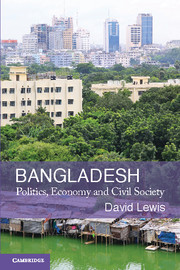Book contents
- Frontmatter
- Contents
- Maps
- Abbreviations
- Acknowledgements
- 1 Introduction
- 2 A State in the Making
- 3 Towards Bangladesh
- 4 State, Politics and Institutions
- 5 Nongovernmental Actors and Civil Society
- 6 Economic Development and Transformation
- 7 Population, Natural Resources and Environment
- 8 Conclusion
- Glossary of Bengali Terms
- Bibliography
- Index
1 - Introduction
Published online by Cambridge University Press: 05 June 2012
- Frontmatter
- Contents
- Maps
- Abbreviations
- Acknowledgements
- 1 Introduction
- 2 A State in the Making
- 3 Towards Bangladesh
- 4 State, Politics and Institutions
- 5 Nongovernmental Actors and Civil Society
- 6 Economic Development and Transformation
- 7 Population, Natural Resources and Environment
- 8 Conclusion
- Glossary of Bengali Terms
- Bibliography
- Index
Summary
On December 13, 2010, the streets of Dhaka were once again convulsed by demonstrations and a strike by the nation's garment workers. Workers blocked the highways and roads with barricades and picketed outside facto-ries, demanding that the government implement a new minimum wage of US$43 per month, which was supposed to have come into effect in November. At least three protesters lost their lives in clashes with police, and dozens more were injured in the violence that followed. Similar protests had taken place earlier in June and July of that year and were the latest in a history of regular garment-worker mobilizations that dated back to the early 1990s. Bangladesh's ready-made garment industry is worth $15 billion annually, accounts for more than three-quarters of its exports and services a wide range of well-known Western clothing companies that include Gap, Marks and Spencer and Walmart. A typical garment worker is a young woman recently arrived from a rural village and who lives in rented slum housing near a factory or an export processing zone (EPZ), where she works as a machinist and earns approximately $1.50 a day. The garment workplace brings her face to face with the contradictions and complexity of a globalised economy: the factory may be Korean-owned, the fabric from Taiwan, the yarn from India and the packaging materials from China, yet the garments that she manufactures will each carry a “made in Bangladesh” label. Located within a remote, weakly regulated outpost of the global capitalist economy, and increasingly dependent on a precarious and exploitative international division of labour, these garment workers are typical of many people in Bangladesh. They try to build a livelihood through working to secure whatever income can be managed from the market, struggling for justice from the state and attempting to organise themselves within a civil society in order to protect their interests.
The aim of this book is to provide a concise, up-to-date overview of the politics, economy and civil society of Bangladesh in a way that makes sense of the achievements and contradictions faced by Bangladesh and its people in a changing world. It is intended as an introductory text for general readers, students and teachers and does not assume prior knowledge of its subject. It aims to move beyond the level of description to dig more deeply under the surface of issues than a traditional textbook might allow. It seeks to engage with current debates and at times challenge received wisdom. The book presents the key background and a wide range of factual information, but the reader should also note that this is also a personal interpretative essay that inevitably reflects my research interests over the past twenty-five years in the broad field of development studies and my own personal positioning as a Western outsider.
- Type
- Chapter
- Information
- BangladeshPolitics, Economy and Civil Society, pp. 1 - 11Publisher: Cambridge University PressPrint publication year: 2011



